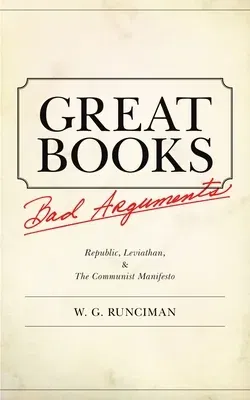W G Runciman
(Author)Great Books, Bad Arguments: "Republic, Leviathan," and "The Communist Manifesto"Hardcover, 21 February 2010

Qty
1
Turbo
Ships in 2 - 3 days
In Stock
Free Delivery
Cash on Delivery
15 Days
Free Returns
Secure Checkout

Print Length
144 pages
Language
English
Publisher
Princeton University Press
Date Published
21 Feb 2010
ISBN-10
0691144761
ISBN-13
9780691144764
Description
Product Details
Author:
Book Format:
Hardcover
Country of Origin:
US
Date Published:
21 February 2010
Dimensions:
20.32 x
13.46 x
2.03 cm
ISBN-10:
0691144761
ISBN-13:
9780691144764
Language:
English
Location:
Princeton
Pages:
144
Publisher:
Weight:
249.48 gm